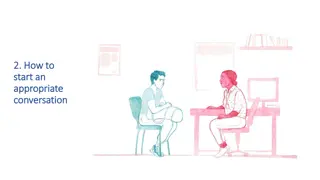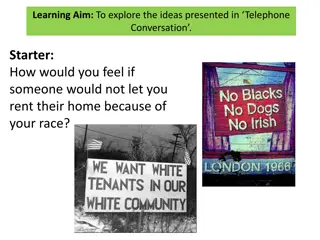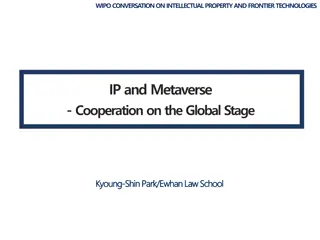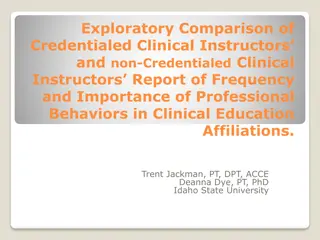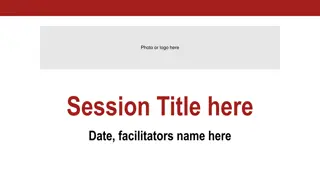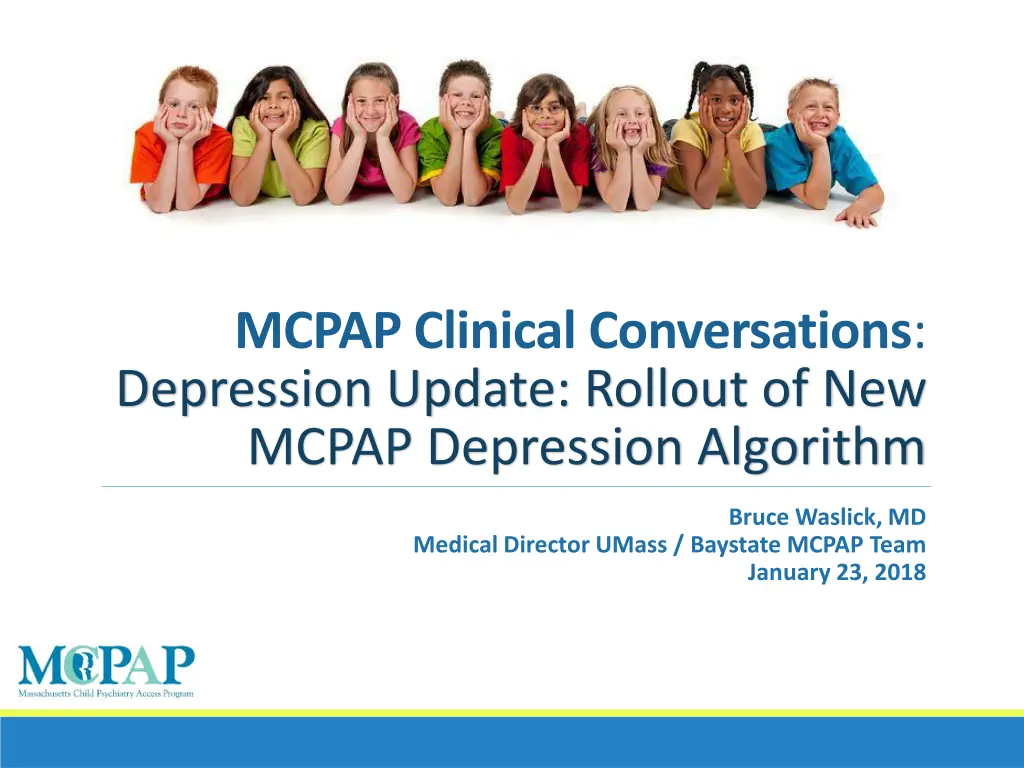
MCPAP Clinical Algorithms: Practical Guidelines for Mental Health in Primary Care
Discover the MCPAP Clinical Algorithms designed to assist primary care providers in managing common mental health conditions like depression, anxiety, and ADHD. These guidelines offer screening recommendations, evaluation procedures, treatment planning considerations, and evidence-supported medication guidelines. Learn how to apply these algorithms effectively in primary care settings and when to seek additional consultation for complex cases.
Download Presentation

Please find below an Image/Link to download the presentation.
The content on the website is provided AS IS for your information and personal use only. It may not be sold, licensed, or shared on other websites without obtaining consent from the author. If you encounter any issues during the download, it is possible that the publisher has removed the file from their server.
You are allowed to download the files provided on this website for personal or commercial use, subject to the condition that they are used lawfully. All files are the property of their respective owners.
The content on the website is provided AS IS for your information and personal use only. It may not be sold, licensed, or shared on other websites without obtaining consent from the author.
E N D
Presentation Transcript
MCPAP Clinical Conversations: Depression Update: Rollout of New MCPAP Depression Algorithm Bruce Waslick, MD Medical Director UMass / Baystate MCPAP Team January 23, 2018 1
Overview Introduction to MCPAP Clinical Algorithms Presentation of MCPAP Depression Clinical Algorithm Questions and Discussion 2
MCPAP Clinical Algorithms: Purpose Creation of practical clinical guidelines for PCP s when dealing with common mental health problems Screening procedure recommendations Guidelines encompass: Evaluation procedures Treatment planning considerations Medication treatment guidelines 3
MCPAP Clinical Algorithms: Content 2. Content includes procedures that can be performed in all algorithms in the context of regular primary care practice 1. Content is developed to be most helpful for PCP in regular primary care practice 4. Content recommends the use of medication guidelines suggesting evidence supported first-line medication treatment for mental health conditions commonly treated in primary care 3. Content recommends the use of standard well-validated clinical rating scales that can be used in primary care practice 4
MCPAP Clinical Algorithms: Process Starting place Conceptualization First 3 MCPAP Clinical Algorithms Content developed through clinical consensus process of MCPAP Medical Directors Leadership Team Initial clinical guidelines for different conditions developed by H. Walter and colleagues for PPOC practices Depression Anxiety ADHD 5
MCPAP Clinical Algorithms: Applications To help train primary care providers in basic evidence-supported tools and procedures for mild-to-moderate, relatively uncomplicated forms of mental health problems that can reasonably be handled in primary care practice To help MCPAP consulting teams provide consistent training and guidance to primary care providers during phone and face-to-face consultations across the state Algorithms will likely not be the best starting point for severely ill, treatment-resistant or highly complicated presentations of mental illness in primary care Primary care providers are encouraged to make liberal use of MCPAP phone consultation and face-to-face consultations for complicated, treatment-resistant or severely ill presentations rather than relying on MCPAP Clinical Algorithms 6
MCPAP Depression Clinical Algorithm First clinical algorithm rolled out by MCPAP teams Provides clinical guidance for the PCP in terms of: Screening for depressive illness in children and teens Diagnostic evaluation procedures Treatment planning considerations Initial medication selection and management procedures 7
Acknowledgement, Origins and Process of Development 9
Clinical Decision- Making Procedures Screening and Evaluation Procedures Medication Selection Support Follow-up and Monitoring Support 10
Acknowledgement, Origins and Process of Development HJ Walter, Department of Psychiatry, Boston Children's Hospital (adapted by MCPAP with permission) 11
Screening and Evaluation Screening and Evaluation Procedures Procedures PCP visit: Screen for Behavioral Health problems Pediatric Symptom Checklist (PSC)-17 (cut-points: 15 total, 5 internalizing, individual depression items) Patient Health Questionnaire (PHQ), ages 12+ (cut-points: 3 [PHQ-2], 10[PHQ-9] 12
At screening: PSC-17-I subscale 5 is considered positive for internalizing symptoms PSC-17-A subscale 7 is considered positive for ADHD symptoms PSC-17-E subscale 7 is considered positive for externalizing symptoms PSC-17 total 15 is considered positive for total problems 13
At screening: PSC-17-I subscale 5 is considered positive for internalizing symptoms PSC-17-A subscale 7 is considered positive for ADHD symptoms PSC-17-E subscale 7 is considered positive for externalizing symptoms PSC-17 total 15 is considered positive for total problems 14
For initial diagnosis: Consider MDD: if 5 s in shaded boxes with Q1 or Q2 positive Consider Other Depressive Disorder: if 4 s in shaded boxes with Q1 or Q2 positive All responses should be verified by a clinician and a definitive diagnosis is made on clinical grounds Diagnoses of Major Depression and other Depressive Disorder require impairment in functioning (Q. 10) Important rule outs : Normal Bereavement Bipolar Disorder Medical Disorders Reactions to medications Illicit substance use 15
Clinical Decision Clinical Decision- -Making Procedures I Making Procedures I Diagnostic Evaluation Symptom rating scales for assessment of depression severity: Mood & Feelings Questionnaire (MFQ)-Long ages 8-18 (cut-point: 27 parent, 29 youth) OR Patient Health Questionnaire (PHQ)-9 ages 12+ (cut-point: 10 moderate, 20 severe) Assessment for red flags and diagnostic rule-outs that would be expected to affect treatment planning Red Flags o Suicidality o Psychosis o Trauma o Substance Abuse Diagnostic Rule-Outs o Normal Bereavement / Adjustment Disorders o Bipolar Disorder o Medical Disorders o Reactions to medications o Illicit substance use 16
Dear potential MFQ user: The following publications present information pertinent to the selection of MFQ cut points for use in various circumstances. There is no single cut point that is best for use in all circumstances. This is true of all screening tests, whether psychiatric or general medical. As a result our group does not recommend any specific cut-points for use with the MFQ. Rather it is up to users to decide what will be most useful in their particular circumstances. Best wishes. Adrian Angold. 17
For initial diagnosis: Consider MDD: if 5 s in shaded boxes with Q1 or Q2 positive Consider Other Depressive Disorder: if 4 s in shaded boxes with Q1 or Q2 positive All responses should be verified by a clinician and a definitive diagnosis is made on clinical grounds Diagnoses of Major Depression and other Depressive Disorder require impairment in functioning (Q. 10) Important rule outs : Normal Bereavement Bipolar Disorder Medical Disorders Reactions to medications Illicit substance use 18
Clinical Decision Clinical Decision- -Making Procedures Making Procedures II II Treatment planning Moderate depression (or self-management unsuccessful): Sub-clinical to mild depression: Severe depression: Refer to specialty care for therapy & medication management until stable Guided self- management with follow- up Refer for therapy; consider medication 19
Medication Selection Support FDA-approved medications for depression: Monitor weekly for agitation, suicidality & other side effects; for severe agitation or suicidal intent or plan, refer to hospital or crisis team for emergency evaluation; consult with MCPAP CAP as needed Fluoxetine: age 8+; Escitalopram: age 12+ If test dose tolerated, increase daily dose Evidence-based medication for depression: Sertraline Fluoxetine 10mg < age 12, fluoxetine 20mg age 12+ Escitalopram 10mg age 12+ Sertraline 25mg < age 12, or sertraline 50mg age 12+ Start daily test dose for 1-2 weeks Fluoxetine 5mg if < age 12, fluoxetine 10mg if age 12+ Escitalopram 5mg for age 12+ Sertraline 12.5mg if < age 12, or sertraline 25mg if age 12+ 20
Follow-up and Monitoring Support At 4 weeks, re-assess symptom severity with MFQ/PHQ-9 If score > cut-point & impairment persists, consult MCPAP CAP for next steps If score < cut-point with mild to no impairment, remain at current dose for 6-12 months Monitor bi-monthly during the second four weeks and monthly thereafter for maintenance of remission, agitation, suicidality, & other side effects; for severe agitation or suicidal intent or plan, refer to hospital or crisis team for emergency evaluation; consult with MCPAP CAP as needed After 6-12 months of successful treatment, re-assess symptom severity with MFQ/PHQ-9 If score < cut-point without impairment, decrease daily dose by 25-50% every 2-4 weeks to starting dose, then discontinue medication; consult with MCPAP CAP as needed 21
MCPAP Clinical Algorithms: Applications Algorithms will likely not be the best starting point for severely ill, treatment- resistant or highly complicated presentations of mental illness in primary care Primary care providers are encouraged to make liberal use of MCPAP phone consultation and face- to-face consultations for complicated, treatment-resistant or severely ill presentations rather than relying on MCPAP Clinical Algorithms 22
Thank you for your attendance and attention! Questions and Comments invited and appreciated! 23





